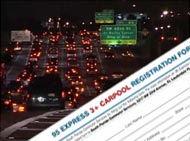7/14/2008
HOT Lanes Discourage CarpoolingHigh Occupancy Toll lanes in some, but not all, states actively discourage carpooling.

"High occupancy" use of so-called High Occupancy Toll (HOT) lanes is actively discouraged in some states to ensure the greatest number of drivers pay for the use of roads. As the US Department of Transportation continues to pressure states to turn existing High Occupancy Vehicle (HOV) lanes into toll lanes, HOT advocates assure carpoolers that tolling will not affect them. Practices adopted by the most recently opened HOT projects suggest this claim may be misleading.
In the 1990s, congressional mandates forced states to adopt HOV lanes as an environmental improvement measure. These lanes promised to encourage ride sharing, thereby reducing the number of vehicles on the road. Supporters argued that this reduction would both lessen congestion in free travel lanes and improve overall air quality. For example, if a group of friends wanted to take the freeway to attend a distant event during rush hour, they could choose to take one vehicle instead of three in return for the benefit of a speedier journey in the special carpool lane.
Such impromptu carpooling efforts are denied free access to the high occupancy lanes in the country's newest federally funded project. The South Florida 95 Express HOT lanes require anyone wishing to take advantage of high occupancy status to pre-register, obtain a set of decals and pay for a SunPass toll transponder. Once approved and the driver's transponder is activated, those carpool journeys deemed acceptable to the Florida Department of Transportation will be free. Those wishing to register must provide extensive personal details to the state-operated toll road and meet a detailed set of criteria (view application form, 150k PDF)."If any member of the carpool does not meet the criteria, the carpool registration request will be rejected unless additional information is provided that would constitute a 3+ commuter carpool," South Florida Commuter Services explains on its website.
- Participants must live within a three-mile radius
- Participants must work within a one-mile radius
- Participants must have a start and end their work day within 30 minutes of one another
The only exception to the detailed distance criteria is that accepted participants are allowed to meet at an approved Park-and-Ride lot. The system offers very little flexibility. If one member of the carpool drops out, a new co-worker cannot join without first submitting his personal details and having his application processed. Decals also expire every six months, requiring constant renewal.
Although Florida imposes these restrictions, Colorado does not. Colorado's state-owned Interstate 25 Express Lane project is designed to allow impromptu carpoolers and motorcyclists to continue with the same free and easy use of HOV lanes. To avoid a registration bureaucracy, the state created two separate lanes for entering the HOT facility -- one for toll payers and one for carpoolers. Strategically placed police enforcement zones on the side of the lanes maximize opportunities for the ticketing of solo drivers who might venture into the untolled carpool lane. Once motorists pass the toll collection zones, they are allowed to use any lane.
Upcoming projects have not been forthcoming about whether a Florida or Colorado model of operation will be put in place. For example, Virginia's Interstate 495 Capital Beltway HOT lane project, which is run by the Australian company Transurban, has kept carpool requirements quiet while the project is still under construction.
"Detailed plans and processes for obtaining any required transponder will be communicated to all users of the HOT lanes prior to the lanes opening," the project website explains. "Fluor-Transurban and VDOT will conduct extensive community education efforts to ensure motorists understand how to use HOT lanes."
According to Virginia's contract with Transurban, taxpayers would have to make payments to Transurban if the HOT lanes actually ended up encouraging carpooling (details).
The story is similar for hybrid vehicles. Although the owners of these politically favored automobiles do not need to go through as much hassle to obtain free use of certain HOT lanes, their free ride could be short-lived. In Colorado and Florida, hybrid owners must buy a toll transponder and send in an application containing the hybrid's license plate and, in Colorado, the vehicle identification number. Owners will then receive a decal to place on their car and driving will be toll free from that point forward on participating roads.
There are strict caps on the favoritism. Colorado, for example, will only allow 2000 hybrids to take advantage of HOT lanes and will only consider allowing more if it does not impact toll revenues significantly.
"The EXpressToll transponder account may be utilized to implement tolling upon hybrid vehicles in the event degradation of travel speed occurs in HOV and express lanes," Colorado's Department of Transportation explains on its website. "Your EXpressToll transponder account will not be charged without advance notice and you will first be given the opportunity to cancel your account and return your transponder."
Hybrids will not have free use of the Virginia HOT lanes.


